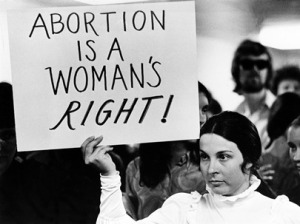A CONDENSED CHRONOLOGICAL LOOK AT AMERICA’S MORAL DECLINE FROM A CHRISTIAN PERSPECTIVE
[The following excerpts are taken from the book, Eradicate: Blotting Out God In America, chapter 14, “The Last 50 Years in America.” These selected events reveal the increase of immorality, secular progressive agendas, and the lack of Christian influence on our culture happening at the same time.]
1970s
1970: The EPA is created to enforce increasing number of environ¬mental protection laws and regulatory agencies. The first Earth Day protests take place.
1972: Abortion is addressed for the first time on television in the prime time sitcom Maude. In a two part episode entitled “Maude’s Dilemma” forty-five-year-old Maude Findlay (Beatrice Arthur) finds she is unexpectedly pregnant and chooses an abortion. Leading up to her decision, her daughter reminds her abortion is now legal. The episode draws millions of protest letters.
1973: In the Saturday Review of Education, radical feminist leader Gloria Steinem declares, “By the year 2000 we will, I hope, raise our children to believe in human potential, not God.”
AMERICA, YOU MAY NOW KILL YOUR BABIES
1973: Roe v. Wade – court makes final decision to legalize abortion in all states. This single, detrimental decision by seven unelected justices defines life and death via federal abortion policy in America. Invalidating 200 years of state law, the ruling is made on the naive basis claiming that “no one knows when life begins.” The judgments made in Roe v. Wade were argued based on a “right to privacy.”
1973: President Richard Nixon orders all remaining U.S. troops to leave Vietnam.
1974: After the Watergate scandal, Richard Nixon is the first US president forced to resign.
1975: First Uncensored Comedy Special HBO features Robert Klein exclaiming, “It’s subscription … we can say anything. Sh*t! How’d you like that? Sh*t!”
1976: State laws requiring parental or spousal consent for abortion are thrown out. Planned Parenthood challenges abortion regulations in Missouri. Abortion again makes its way to the Supreme Court in Planned Parenthood v. Danforth. Court decides that husbands have no say over their wives decision to abort, and parents have no say over their daughter’s decision to abort. In his dissent from this landmark opinion, Justice William Rehnquist argued that the State should recognize the husband’s interest in the life of his child and that this decision was “tantamount to the biological disenfranchisement of fathers.”
1976: Jonestown, Guyana Massacre. On November 18, 1978, “Peoples Temple” cult leader Jim Jones instructs his followers to commit “revolutionary suicide” by drinking cyanide-laced fruit punch. Many drink willingly while some drink by force. At the Jonestown compound in Guyana, 912 Peoples Temple members (276 of whom were children) died. Jim Jones died the same day from a gunshot wound to the head. Earlier, California Rep. Leo Ryan took reporters and a camera crew to Guyana to investigate suspicions that some people were being held against their will. Their visit went fine until Ryan offered to take a few people back to America with his team. While leaving, they were shot and killed near the plane on the air strip.
Jim Jones envisioned a communist community and Jonestown was to be a utopia away from U.S. influence and under his control. He was simply a lying cult leader who manipulated sincere Americans who wanted a better life. He sought an isolated community where they could escape American capitalism and practice a more communal way of life.
According to CNN, Jones was a phony faith healer, and much of his money came in mail-order donations. Elderly members handed over their Social Security checks, working adults gave 25 percent of their wages to the church, and some signed over all their property. Government investigators would later find at least $10 million in Swiss banks, mainly in Panama. Another $1 million in cash was recovered in Jonestown. Jones, a leftist who had no formal theological training, based his ministry on a combination of religious and socialist philosophies.
1976: The Hyde Amendment is enacted. Congress adopts the first version of the legislation proposed by pro-life Congressman Henry Hyde (R-IL), barring the use of federal funds to pay for abortions.
1977: The ACLU opposes the Hyde Amendment claiming it unfairly targets low-income women and the amendment is revised. The original measure made no exceptions for cases of pregnancies that were the result of rape or incest or that threatened the lives of pregnant women. As a result, beginning in 1977 language was added to provide for such circumstances.
1978: Federal Communications Commission v. Pacifica Foundation – the “Seven Dirty Words” case. The Supreme Court holds that the government can constitutionally regulate indecent broadcasts. It came about when a father complained to the FCC about his son hearing George Carlin’s “Filthy words” routine one afternoon on the radio. The station received a letter of reprimand from the FCC. The U.S. Supreme Court upheld the FCC action by a vote of 5 to 4, ruling the routine was “indecent but not obscene.” The Court stated the FCC had the authority to prohibit such broadcasts during hours when children were likely to be among the audience.
1979: The Iran Hostage Crisis – American Hostages are taken in Tehran. Islamic radicals take over the American embassy holding sixty-six Americans hostage for 444 days. The crisis was a diplomatic one between Iran and the United States over the support of the Iranian Revolution. President Carter called the hostages “victims of terrorism and anarchy.” The crisis which followed this seizure created a near state of war, ruined Jimmy Carter’s presidency, and began an environment of hostility between America and Iran which continues to this day. In 1981, the hostages were formally released into United States custody shortly after the new American president, Ronald Reagan, was sworn into office.
1980s
1980: Take the Ten Commandments down! In a five to four decision, the Supreme Court rules a Kentucky law, requiring the Ten Commandments to be posted, is unconstitutional. For years, the schools in Kentucky had copies of the Ten Commandments posted in the hallway. In the case Stone v. Graham, it was ruled: “If the posted copies of the Ten Commandments are to have any effect at all, it will be to induce schoolchildren to read, meditate upon, perhaps to venerate and obey the Commandments … this … is not a permissible state objective.”
1981: “Music Television” – MTV launches an entirely unique new product that would be one of the biggest influences on American youth for twenty-five years. Having a profound influence on the music industry, fashion and pop culture, MTV’s moral influence on young people, including issues related to censorship and social activism, become subject of intense debate.
- In 1992, MTV started a pro-democracy campaign called Choose or Lose, to encourage millions of people to register to vote, and the channel hosted a town hall forum for then-candidate, Bill Clinton.10
- In 2001, MTV’s hate crimes awareness campaign included airing a made-for-TV movie Anatomy of a Hate Crime, based on the 1998 murder of twenty-one-year old homosexual Matthew Shepard.
- In 2005, the Parents Television Council released a study, MTV Smut Peddlers, which sought to expose MTV’s excessive sexual, profane, and violent content.
- In 2010, a study by the GLADD found that of the 207.5 hours of prime time programming, 42% included content reflecting the lives of gay, bisexual and transgendered people – the highest gay-friendly percentage ever.
1981: Gay-Related Immune Deficiency (GRID) identified by CDC (Later changed to “AIDS”).
1981: An Arkansas state law passes, mandating the teaching of Creation Science in schools. Equal time was to be given also to evolution. A legal action was mounted (McLean vs. Arkansas) to overturn the law. Scientists and many main-line Christian churches were pitted against conservative Christian groups. The law was declared unconstitutional.
1984: Berkeley, California becomes first city with a domestic partner law.
1984: President Ronald Reagan announces the “Mexico City Policy.” The Reagan Administration denies U.S. family planning funds to any overseas organizations that used their own private funds for abortion services, counseling, or referral.
1986: The first time the word “condom” is used in prime-time on the show Cagney & Lacey.
1986: The first openly lesbian couple is granted legal joint adoption (California).
1986: No more abortion restrictions whatsoever! In a five to four court decision in Thornburg v. American College of Obstetricians and Gynecologists, all restrictions on abortion were struck down. No more requirements to inform women about alternatives to abortion. No more requirement to: educate women about prenatal development, to inform women about the potential risks of abortion, to keep medical records of abortions, and no requirement that third trimester abortions be performed in such a way as to spare the life of the viable child. All these were argued to be violations of a woman’s right to privacy.11
1987: The Gay and Lesbian Caucus of the National Education Association is established.
1987: The Last Temptation of Christ hits theaters. Like the novel, the film depicts the life of Jesus Christ and His struggle with various forms of temptation including fear, doubt, depression, and lust. The movie depicts Christ being tempted by imagining Himself engaged in sexual activities. Naturally, secular reviewers including Roger Ebert gave the film four stars out of five. Though the movie tanked at the box office, Martin Scorsese received an Oscar nomination for Best Director. In one offensive scene, Jesus and Mary Magdalene consummate their marriage.
1989: Seinfeld airs for the first time on NBC. The sitcom runs until 1998 and becomes a classic. In 2002, TV Guide named Seinfeld the greatest television program of all time. E! named it the “number 1 reason the ‘90s ruled.” The show had a dramatic impact on American culture. For example, in 2009, the episode on masturbation was ranked #1 on TV Guide’s list of “TV’s Top 100 Episodes of All Time.” The prevalent theme on Seinfeld was that life is pretty much meaningless or irrational. This is consistent with the philosophy of absurdism. The characters had an indifference to morality and never seemed to learn their lessons.
1989: Denmark is the first country to legalize same-sex marriage.
1989: Communism fails and the Berlin Wall comes crashing down, signaling the end of the Cold War. In Poland, Hungary, and Czechoslovakia in 1988 and 1989, communism falter and new exodus points are opened to East Germans who want to flee to the West. People are in shock that the borders are really open. Jennifer Roesnberg writes in The Rise and Fall of the Berlin Wall that there was a spontaneous and “huge celebration along the Berlin Wall with people hugging, kissing, singing, cheering, and crying.”12
Click Here for: The Previous Decade: The 1960’s & Introduction to The Last 50 Years in America
Click here for: The 1990′s timeline of immorality – part three of four excerpts
Click here for: The Conclusion of chapter 14 and the years 2000 – 2012, part four of four







